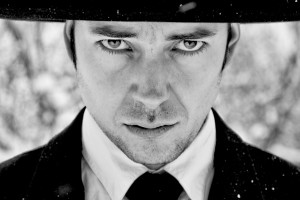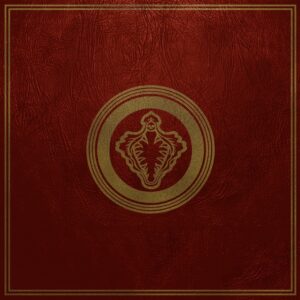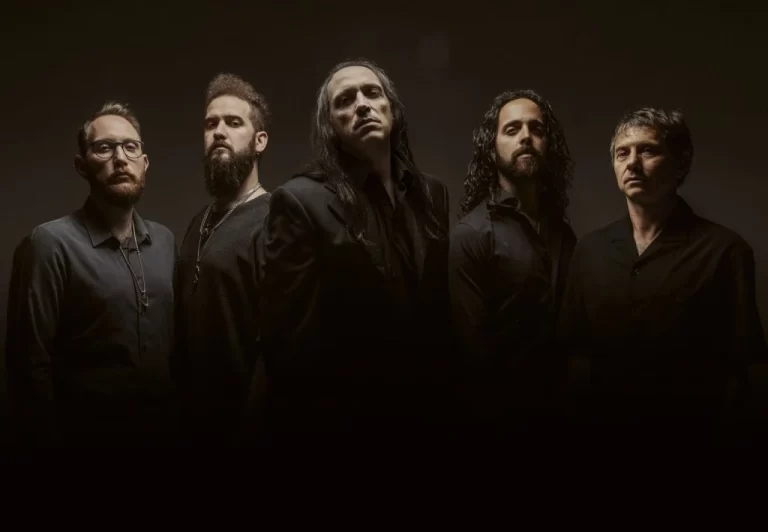
The release of ‘the gospel’ marks the end of a long period of uncertainty for frontman Kjetil Nernes who, back in 2014 (and on the eve of a UK tour) was diagnosed with throat cancer. The treatment that followed was harrowing in the extreme and involved Brachy, a particularly invasive form of cancer therapy that involves tubes being inserted through the tongue and into the throat. Those with a strong stomach can read about Kjetil’s traumatic experiences in an excellent interview with The Quietus.
Inevitably the experiences that Kjetil underwent informed the dark mindset that underpins ‘the gospel’, Arabrot’s latest (and arguably most impressive) album. Still intelligently chaotic, ‘the gospel’ takes its cue from the noise rock pioneers of the late eighties / early nineties, nodding to the likes of the Jesus Lizard, the Melvins, Earth and the butthole surfers and, like the music of those ever-inventive artists, ‘the gospel’ is an album best heard as a complete cycle. We were given the opportunity to put some questions to Kjetil by email regarding the development of the album and the forthcoming Arabrot tour – what follows is our exchange.

Sonicabuse: Hello lovely people of Arabrot! – we, SonicAbuse, prostrate ourselves before your dark and sickly magnificence in an obsequious display of obedience before asking that you muddle through our poor questions!
Arabrot produces very eclectic music, but whilst ‘the gospel’ is certainly varied, it is also a very concise release. To what extent is a challenge to develop an album which ebbs and flows in the way ‘the gospel’ does?
First off, thanks. I’m glad you like the album. It actually comes quite naturally to me making diverse albums, varied albums, and I think it probably sounds concise because I have a very distinct idea of what I want sonically. My taste in music is varied so no wonder my own music sounds that way too.
When it came to recording the album, which personnel were involved and how were the songs themselves developed?
I wrote the songs through 2014/15 when recovering from being seriously sick, at least arranged the riffs properly and wrote the lyrics. We went to Albini’s studio in Chicago to do basic tracking, then invited our friends to so-called overdub sessions in the church me and my wife live in. It all worked out really well and we had some amazing contributions from people like Stephen O’malley and Ted Parsons. I’m real happy about how it turned out.
The bulk of the album was, I believe, written around the time you were suffering from a serious medical condition. To what extent did you consciously allow the uncertainty regarding your health to overflow into the development of the music.
I was of course sure I was going to die and that certainly overshadows the thematics. The man who has been in hell, never forgets you know.
Solar Anus won a Norwegian grammy – did that sort of cultural recognition of your work create any sense of pressure in the development of this album?
Not at all. It was a great experience and nice recognition, but nothing that would in any way make an impact on my artistic work.
The music of Arabrot seems to place an individual and interesting spin on the oblique no-wave movement – what would you say has particularly influenced you, not just in terms of music but in terms of literature and philosophy on this album?
Films such as Faust and Hitchcock’s Rebecca is maybe the most obvious references, but the feeling of Verdun 1916 as described through black and white documentaries is the most important. The soldier overlooking the battlefield. In general I wanted the album to sound British. – British as in 80’s new wave, Killing Joke, The Fall, Wire etc. – plus the attempt of writing proper murder ballads. There’s a lot of death here.
Your live performances are centred around projecting the music and developing the atmosphere of the recordings – what can audiences expect from the forthcoming tour?
People can expect a first class noise rock show by the most accomplished and competent line up of Årabrot so far.
Despite the complex atmosphere evoked by much of your music, I can’t help but be reminded of the more arch US acts like Butthole Surfers and the melvins and previous interviews also suggest that you treat what you do with a certain amount of distance and humour – is there a part of Arabrot that thrives on antagonizing the mainstream – on being the “anti-Van-Halen” still?
I spend too much time reading weird erotica to be anything like Van Halen so the anti-Van-Halen style of music comes quite naturally. There will always be a sort of humourous distance to parts of what I do – which is important to not go insane – but my flirt with death through cancer seems at the moment to have killed some of the most comical stunts. We’ll see what the future brings.
The new album is coming out on a variety of formats including g the now ubiquitous LP and also as a special, very limited edition box set. Does the choice of configurations come from the label or are you, as a band, involved in the physical production of the music and interested in how it is consumed?
It is very much a collaborative effort. Me and Kallevik at the Fysisk Format office work very close. I am very specific about the cover artwork and how the record is printed so obviously have a word about that too, but usually we will discuss internally about how to release the records.
What would you consider to be your main ambition for the band now?
To step up the game.
Any final words for your UK (victims) fans?
See you in March!



